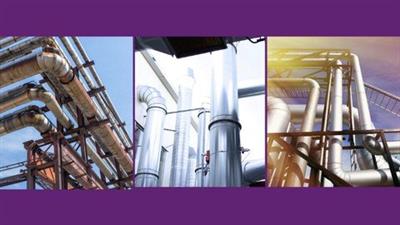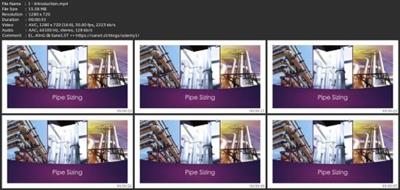
Pipe Sizing In Process Plants
Last updated 8/2022
MP4 | Video: h264, 1280x720 | Audio: AAC, 44.1 KHz
Language: English | Size: 657.20 MB | Duration: 1h 6m
Understand how to choose the suitable line size for a fluid based on the required criteria[/center]
What you'll learn
Learn how to calculate the main parameters used for pipe sizing for liquid, gas and two phase flow
Know the common velocity criteria used for judging a pipe size for different fluid services
Know the common pressure drop criteria used for judging a pipe size for different fluid services
See how two phase flow regimes affect the pipe
See some examples of choosing the suitable pipe size and how the chosen criteria affects the pipe diameter
Requirements
Basics of fluid mechanics
Description
Pipe sizing is one of the first major activities a process engineer carries out during the preparation of the P&ID.Pipe size is an important factor for a well-designed process. It shall affect fluid velocity, pressure drop, flow regime,.etc.A poorly sized pipe can cause disturbance to the whole process and may lead to plant shutdown in critical cases.Pipe size also has a lot to do with cost, oversizing a pipe means extra cost, more complex pipe design, more foundation, even sometimes process issues.In this course, you'll learn how to choose the correct pipe size that works with the corresponding fluid service and compare it with velocity, pressure drop, and two-phase flow regime criteria.Through this course, you'll see how to calculate the velocity and pressure drop of a fluid in the pipe. Then after calculating the parameters, we'll see the expected criteria range for each service, so that we can compare them with our calculated parameters.We'll see also what are the two-phase flow regimes and how we should deal with them.Finally, I'll give some examples for pipe sizing and I'll give an Excel sheet that can guide you on how to size pipes in the future.
Overview
Section 1: Introduction
Lecture 1 Introduction
Lecture 2 Main Sizing Criteria
Section 2: Velocity Criteria
Lecture 3 Effect of velocity on a pipe
Lecture 4 Calculate velocity in a pipe
Lecture 5 Pipe sizing velocity criteria for liquids
Lecture 6 Velocity criteria for gases and two phase flow
Section 3: Sizing the pipe with respect to pressure drop
Lecture 7 Pressure Drop sizing approaches
Lecture 8 Calculate friction factor
Lecture 9 Calculating pressure drop for two phase flow
Lecture 10 Pressure drop criteria
Lecture 11 Hydraulic loops
Section 4: Two Phase Flow regimes
Lecture 12 Two phase flow regimes
Lecture 13 How to avoid or reduce slug flow?
Section 5: Pipe Characteristics
Lecture 14 Determine pipe internal diameter against pipe schedule
Lecture 15 015-Consider fittings and calculate pipe equivalent length
Section 6: Let's start pipe sizing
Lecture 16 Tools to calculate pipe sizing
Lecture 17 Pipe sizing examples introduction
Lecture 18 Example 1- Condensate at pump discharge
Lecture 19 Example 2- LPG at pump suction
Lecture 20 Example 3- Gas at compressor suction
Lecture 21 Example 4- Two phase flow example
Section 7: Bonus Section
Lecture 22 Bonus Lecture
Engineers who want to understand the main basis for pipe sizing,Chemical Engineering Graduates or undergraduates
[align=center]
download скачать link
rapidgator.net:
https://rapidgator.net/file/12a050e9351af5ab4864d6c9e44e96d6/komln.Pipe.Sizing.In.Process.Plants.rar.html
uploadgig.com:
https://uploadgig.com/file/download скачать/f7a6316d65b79cEc/komln.Pipe.Sizing.In.Process.Plants.rar
nitroflare.com:
https://nitroflare.com/view/C12287A27A6DE82/komln.Pipe.Sizing.In.Process.Plants.rar
1dl.net:
https://1dl.net/463a6hkivw8n/komln.Pipe.Sizing.In.Process.Plants.rar.html

